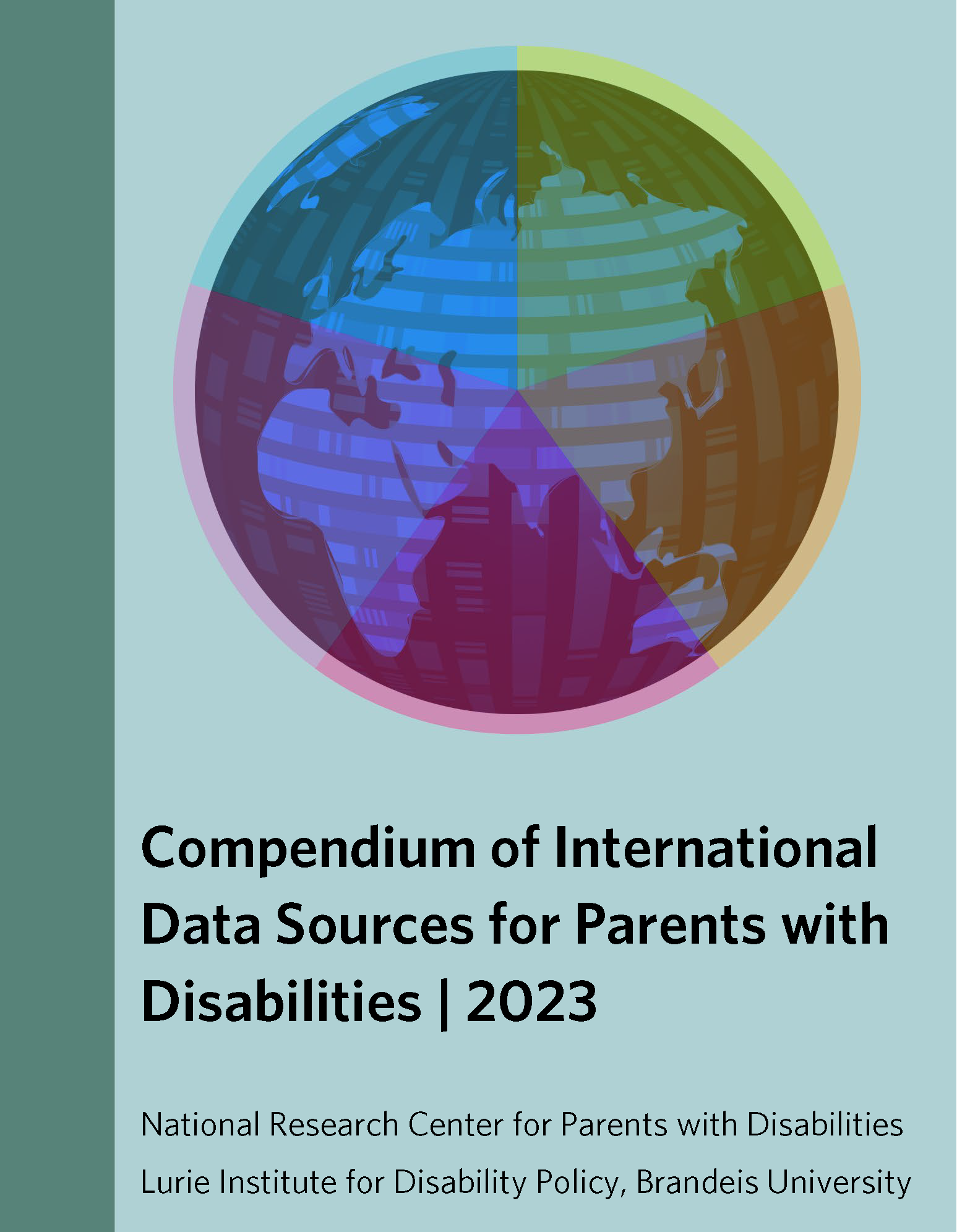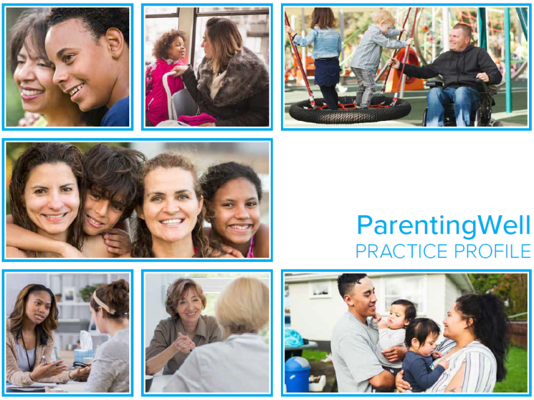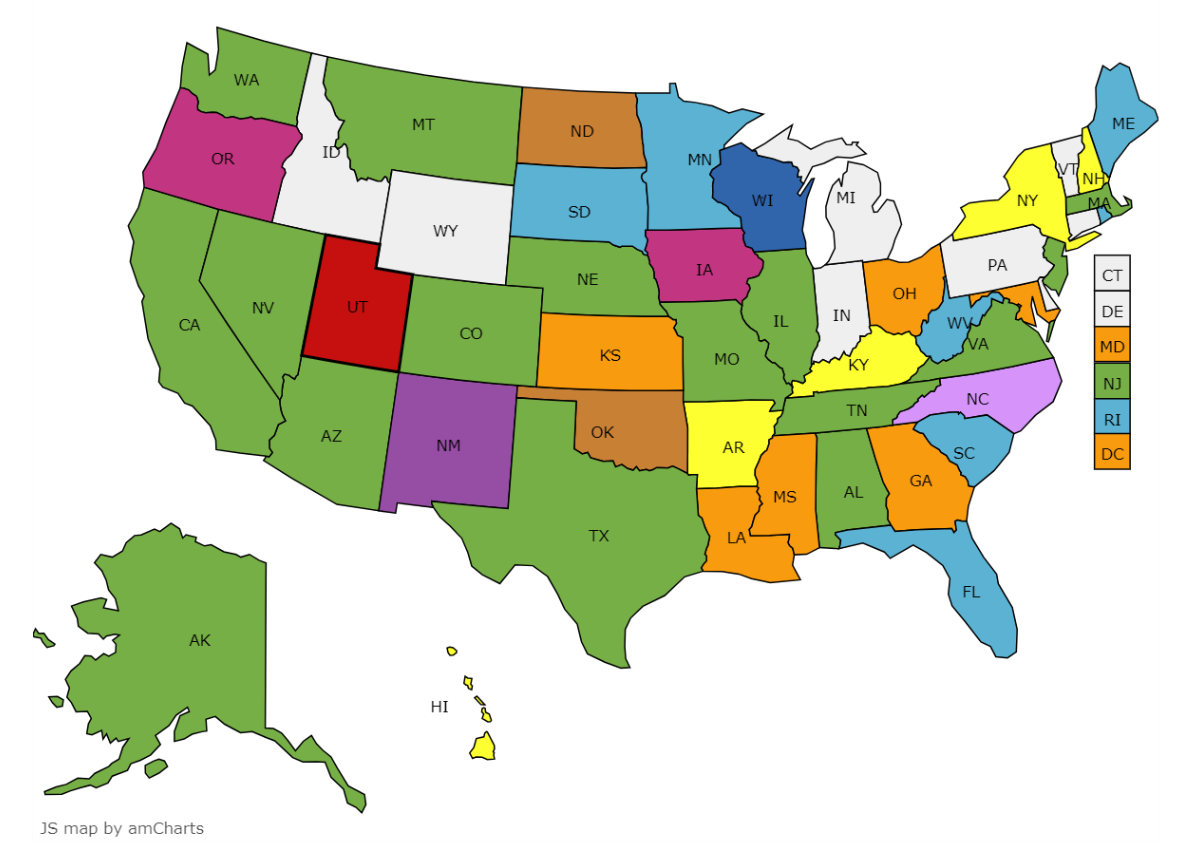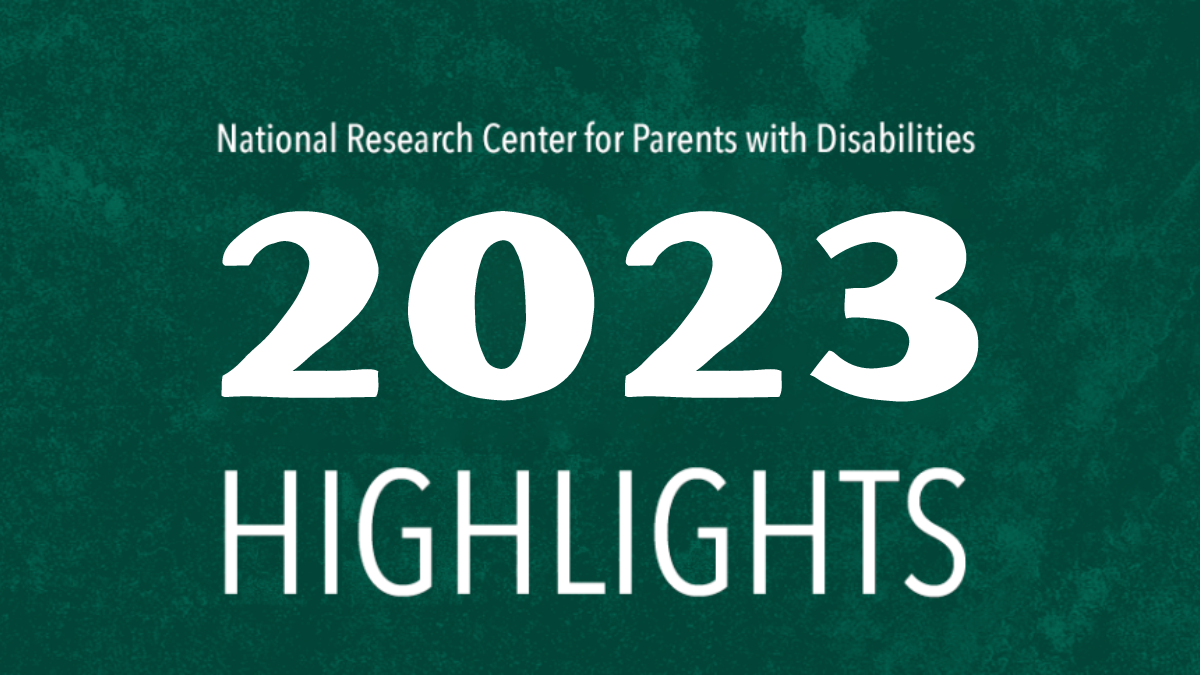Welcome to our newsletter, where the National Research Center for Parents with Disabilities will share research-informed updates for parents with disabilities and professionals who work with parents with disabilities.
Subscribe to our newsletter plus other occasional notices:

January 2023 Annual Newsletter
Welcome
Welcome to our annual newsletter, where the National Research Center for Parents with Disabilities shares research-informed updates for parents and prospective parents with disabilities and their families as well as professionals who work with parents with disabilities. We are delighted to share some of our highlights from 2023.
Featured Work
We've released our updated Compendium of International Data Sources for Parents with Disabilities!
 This compendium is a product of the first-ever International Consortium of Research on Parents and Parentings with Disabilities, which is hosted by the National Research Center for Parents with Disabilities.
This compendium is a product of the first-ever International Consortium of Research on Parents and Parentings with Disabilities, which is hosted by the National Research Center for Parents with Disabilities.
This research will ultimately inform targeted interventions to reduce and/or eliminate disparities.
The international compendium lists 12 data sets from 8 countries that include indicators of both disability and parental status, so that researchers can investigate questions related to the prevalence and life circumstances of disabled parents, including parents from multiple countries.
Versions will soon also be available in Spanish and plain language.
Spotlights
We are delighted to share that we hosted a free training for lawyers, entitled “Keeping Families Together: Preparing Attorneys to Represent Parents with Disabilities in Child Welfare Cases.” The training focused on how to use disability law to defend clients’ rights in child welfare cases. More than 70 attorneys from around the country participated in the training and, due to the enthusiastic demand, we will offer a second round of this training in 2024.
This training is a partnership between the National Research Center for Parents with Disabilities, The University of Massachusetts Chan Medical School, and The Disability Rights and Education Defense Fund (DREDF).
 We are also thrilled to announce that we hosted our ParentingWell Learning Collaborative for behavioral health practitioners in Philadelphia! This learning collaborative prepares behavioral health practitioners to routinely talk about parenting, children, and family experiences throughout an adult’s recovery process. We partnered with Community Behavioral Health in Philadelphia to offer this free training, and we will share lessons learned during the coming year!
We are also thrilled to announce that we hosted our ParentingWell Learning Collaborative for behavioral health practitioners in Philadelphia! This learning collaborative prepares behavioral health practitioners to routinely talk about parenting, children, and family experiences throughout an adult’s recovery process. We partnered with Community Behavioral Health in Philadelphia to offer this free training, and we will share lessons learned during the coming year!
Research Highlights
 We are happy to share our map of state termination of parental rights laws that include parental disability. This interactive map is based on our legal analysis and shows the inclusion of parental disability as grounds for the termination of parental rights.
We are happy to share our map of state termination of parental rights laws that include parental disability. This interactive map is based on our legal analysis and shows the inclusion of parental disability as grounds for the termination of parental rights.
In January of 2023, we published a paper called “Residency Differences Between Fathers With and Without Disabilities in the United States” in Family Relations. This article shows that disabled fathers were more likely to live apart from at least some of their children than nondisabled fathers, but these disparities only persisted for those with two or more types of disabilities, after controlling for socioeconomic characteristics. Please check here for our upcoming research brief on this paper.
In September of 2023, we published an article called “Housing Circumstances of Disabled Parents Within the Child Welfare System” in Children and Youth Services Review. We found that parents with disabilities compared to parents without disabilities have higher rates of inadequate housing. The risk is compounded for Black disabled parents. Our brief on this article will be available on our website.
Research briefs with key findings from our researchers' articles are published on our website.
Community Perspectives
Read our newest blog posts!
Alisha McMillen, a mother with a physical disability, writes about her experiences with psoriatic arthritis, which can cause debilitating pain. She reminds others that many disabilities are invisible, and therefore we “should not judge a book by its cover.” And Chelsea Devona expected her pregnancy would be tough; then she found out she was carrying twins and, soon after that, she was diagnosed with hyperemesis gravidarum, the "morning sickness from hell."
Are you a parent with a disability who would like to share your story? We want to hear from you!
Webinars
Our free webinars offer information about parenting with a disability, from parents with lived experience and the professionals who support them.
In October of 2023, we hosted a webinar entitled “Strategies to Support Parents With Psychiatric Disabilities: Perspectives from Staff Providing Legal Services.” Presenters included staff from Community Legal Services in Philadelphia, a legal aid organization that provides free legal representation to disabled parents. Presenters also included researchers from the National Research Center for Parents with Disabilities, Drs. Robyn Powell and Miriam Heyman. Presenters explored the experiences of parents with psychiatric disabilities with child welfare involvement, including barriers and facilitators to positive outcomes.
In August of 2023, we provided a webinar entitled “Multiplying the Challenge: Parenting as a Disabled Immigrant.” Panelists Jennifer Senda and Angelica Garcia (both disabled immigrant parents) talked about how citizenship and immigration statuses impact their lives when they take on parental roles. The webinar was facilitated by Dr. Luanjiao Aggie Hu, a disabled immigrant mother, and a researcher at The National Research Center for Parents with Disabilities.
Other webinars in 2023 included “Disabled Parenting Within Multigenerational Families” and “Parents and Parenting With Disabilities: Perspectives from Chile.”
Would you like to view one of these webinars?
Recordings of all of our webinars are available here.
About Us
January 2022 Annual Newsletter
Welcome
Welcome to our annual newsletter, where the National Research Center for Parents with Disabilities shares research-informed updates for parents with disabilities and professionals who work with parents with disabilities. We had an exciting 2021 and are delighted to share some highlights with you.
Spotlights
- Heather Watkins,
- Jennifer Senda,
- Judith Brown,
- Julie Petty,
- Keith Jones,
- Laura Stout,
- Morenike Giwa-Onaiwu,
- Nicole Lomerson,
- Patrick Cokley,
- Tana Pradia, and
- Earl Allen.
- Denise Simon,
- John Pirone,
- Julie Kegley,
- Kevin Irvine,
- Melinda Haus,
- Tammy Rayess, and
- Maureen Martowska.
This new grant will also include a brand new International Consortium of Research on Parents and Parenting with Disabilities. Members include:
- Dr. Marjorie Aunos,
- Dr. Karin van Doesum,
- Dr. Margaret Spencer,
- Dr. Carmit-Noa Shpigelman,
- Dr. Nomfundo Moroe,
- Dr. Gwynnyth Llewellyn,
- Dr. Helen Leonard,
- Dr. Gabrielle Hindmarsh,
- Dr. Maurice Feldman, and
- Dr. Susan Collings.
Research and Information
We are happy to share our newest article called “Barriers and Solutions to Passing State Legislation to Protect the Rights of Parents with Disabilities: Lessons from Interviews with Advocates, Attorneys, and Legislators.”
This article describes interviews with advocates, attorneys, and legislators about (1) the obstacles they face when trying to pass laws that protect the rights of parents with disabilities, and (2) solutions that have helped them to pass laws that protect parents with disabilities and their children. The article was published in the Journal of Disability Policy Studies, and a research brief is available on our website.
This past year the National Research Center for Parents with Disabilities has been pleased to offer a range of events and publications devoted to disabled parents and their families. In the upcoming year, we look forward to exciting work and events on both new and ongoing issues and projects, in collaboration with our partners and the community. To learn about all of our activities, please visit our website.
In July of 2021 we published a paper on the parent-centered planning intervention, which aims to enhance supports for parenting for parents with disabilities. The paper is entitled “Enhancing Supports for Parents with Disabilities: A Qualitative Inquiry into Parent Centered Planning” and it was published in the Journal of Family Social Work. The study found that nearly all parents participating in the intervention strengthened relationships during the process of participation, clarified their goals related to parenting, and made progress toward their identified goals.In 2021 we also published an article titled “Birth Intentions among US Fathers with Disabilities.” This study examined disparities in birth intendedness among fathers with and without disabilities and explored whether the differences vary by marital status or race/ethnicity. Researchers found that fathers with disabilities were almost two times (1.89) as likely to report their last birth as unwanted versus intended compared to those without disabilities. You can find the article in the Disability and Health Journal, and it is discussed in this research brief on our website. Our ParentingWell Project provides an approach for behavioral health practitioners that makes talking about parenting, children, and family experiences a natural part of the conversation during an adult’s recovery process. This year we published an article about the feasibility and impact of supporting practitioners in Massachusetts to use ParentingWell via the ParentingWell Learning Collaborative. Check out the article published in the Community Mental Health Journal!
Webinars
Our free online webinars offer information about parenting with a disability, from parents with lived experience and the professionals who support them.
In June of 2021, we hosted a virtual State-of-the-Science Conference on current research and future directions for parents with disabilities and their families. The three-webinar series included the following topics:
- Peers have much to offer parents: Leveraging the benefits of lived experience;
- Reimagining a child welfare system that works for parents with disabilities and their families;
- Reflections from Advisory Board Members on the State of the Science.
You can find recordings of the State-of-the-Science webinars here.
Other webinar topics in 2021 included: "Coping with COVID-19: Parenting with a Disability during a Pandemic" and "The Role of Disabled and Deaf Fathers in the Family."
Would you like to view one of these webinars? Recordings of all of our webinars are available here.
Blog
Community Blog
Call for Submissions
About Us
March 2020 Newsletter
This month, our updates include two new articles on the legal and healthcare needs of parents with disabilities, a new entry on our Community Blog, updates about state legislation, our next webinar, and our updated Spanish website.
Research
Legal Needs of Parents with Psychiatric Disabilities
We are excited to share our newest publication, “Responding to the Legal Needs of Parents with Psychiatric Disabilities: Insights from Parents' Interviews.” Our researchers interviewed twelve former clients of a legal services program in Massachusetts that provides representation to clients
with disabilities. From the interviews, researchers identified the following themes: Clients with psychiatric disabilities reported that the legal profession lacks an understanding of mental health; they suggested that attorneys should provide parents with psychiatric disabilities services beyond litigation, including assistance with administrative tasks; and they shared that they may have ongoing legal needs, beyond those related to the child welfare system. These findings contain important implications for the legal profession. The article appeared in Law & Inequality: A Journal of Theory and Practice.
Health Disparities among Parents with Disabilities
In October of 2019, the National Research Center for Parents with Disabilities published an article entitled “Do disability, parenthood, and gender matter for health disparities?: A US population-based study.” Researchers analyzed data from more than 40,000 US parents and nonparents with and without disabilities. They found that parents with disabilities are at especially high risk of reporting frequent physical distress, smoking, and lack of sleep. They are also more likely to report higher Body Mass Index (BMI) scores. This article was published in the Disability and Health Journal, and suggests the need for policies and programs to address health related needs of parents with disabilities.
Blog
Check out our newest blog! Heather MacMurray is a mother with MS and she wrote the blog for this quarter, entitled “It’s Hard But It’s Worth It.” Are you a parent with a disability who would like to share your story?
Legislation Map
More than 25 states have introduced or passed legislation providing support for parents with disabilities. Our interactive map offers legislation summaries, status, disability types covered, and links to the full bills.
Recent updates include…
In 2019, Alabama passed House Bill 24, mandating that a parent’s blindness cannot be used to prevent visitation or custody in child welfare cases.
The Indiana Senate is currently considering a bill (Senate Bill 312) which would provide that the rights of a person with a disability to parent the person’s child may not be denied or restricted solely because the person has a disability.
Spotlight
Did you know that we now have Spanish and English versions of our website? To access all of our resources in Spanish, visit the brand new Spanish website for the National Research Center for Parents with Disabilities.
About Us
The National Research Center for Parents with Disabilities is a collaborative research and advocacy project supporting parents with disabilities. Housed at the Lurie Institute for Disability Policy at Brandeis University’s Heller School, we collaborate with other institutions such as Northeastern University, University of Minnesota, and University of Michigan. Through research expertise and first-hand experience, we create a comprehensive resource for disabled parents, family members, clinicians, and policymakers Our advisory board is composed of parents with disabilities or their family members, and we are guided by the principle, “Nothing about us without us.”

